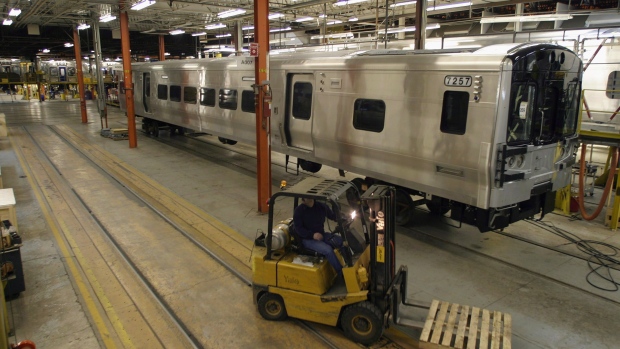Apr 11, 2017
Siemens, Bombardier reportedly vie for control of rail JV
, Bloomberg News

FRANKFURT - Talks about uniting the rail operations of Germany's Siemens (SIEGn.DE) and Canada's Bombardier (BBDb.TO) are being complicated by the desire of both companies to keep control of a merged business, two people close to the matter said on Wednesday.
Antitrust issues and political considerations could also ultimately make a deal to create a company with combined sales of US$16 billion hard to pull off, industry experts said.
The two groups are talking about a joint venture that could compete better with Chinese state-backed market leader CRRC, which is expanding aggressively abroad and would still be twice their combined size by revenue.
"It could go fast, it could be very drawn-out or it could fail. It's completely open," one of the people said.
The three main rivals to CRRC -- Bombardier, Siemens and France's Alstom (ALSO.PA) -- have talked to each other about combining their businesses in various arrangements over the past years.
A Bombardier-Siemens combination could run into anti-trust issues as it did last time it surfaced, with significant overlap particularly in Germany.
"On a country-by-country basis the deal looks difficult to pull off in Europe, and that's why it has not happened over the past 20 years," a person familiar with the industry said.
In a global context the arrival of CRRC has however changed the shape of the industry and Europe should be interested in creating a strong competitor to the emerging Chinese challenge, the person said.
However, antitrust experts doubt that watchdogs will give the deal a green light without imposing conditions that could make it unviable.
"Besides Alstom no real competitor would remain in Europe as long as the Chinese haven't arrived," said Dario Struwe, antitrust lawyer at law firm FPS.
JOBS FEAR
Any transaction also runs the risk of resistance from trade unions.
One of the sources told Reuters that German unions were expected to support the deal as long as Siemens was in control. The two businesses, which span rolling stock to signaling, have significant overlap in Europe, especially in Germany.
German trade union IG Metall declined to comment on the matter.
But given the Bombardier founding family's influence on the company - they control the company through a dual class share structure - it is highly doubtful that Bombardier would agree to relinquish control to Siemens.
One of the sources also said that the German chancellery was involved in the situation, without giving details. Another complication is that Canadian pension fund giant Caisse de depot et placement du Quebec owns 30 percent of Bombardier's train business.
A German government spokesman declined to comment.
For Alstom, a deal might not be all bad.
"(Alstom) will have a higher chance of gaining share given that the other two companies would need to address anti-trust concerns first and then integrate the two operations which likely is a cumbersome process, particularly the integration of the various platforms which could lead to market share losses," analysts at JP Morgan said in a note to clients.
SIMILAR IN SIZE
Bombardier has had problems in the past executing on its contracts, including issues in Canada and Australia. It claims it has fixed the source of these problems.
Siemens' transportation business used to be notorious for similar risks -- with product flaws in trams and more recently repeated delays in supplying high-speed ICE trains to state-owned German national rail operator Deutsche Bahn.
Since Joe Kaeser took over as chief executive in 2013 the company has worked to resolve these issues and appears to have put them behind it for the time being.
The two transportation businesses are roughly comparable in terms of revenue and profitability.
Bombardier Transportation has set targets of generating about $8.5 billion in revenues and an EBIT margin of about 7.5 percent in 2017, up from $8 billion and an EBIT margin of under 6.5 per cent in 2016.
Siemens Mobility made revenue of 7.82 billion euros ($8.3 billion) and increased its operating profit by 15 per cent to 678 million euros last fiscal year, giving it a profit margin of 8.7 per cent. Its target profit margin range is 6-9 percent.
"Such a merger would create the clear number-two player in the rail sector, with a global leading network of clients and installed equipment and service opportunities," analysts at brokerage Kepler said.


